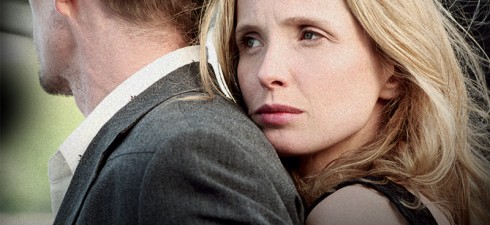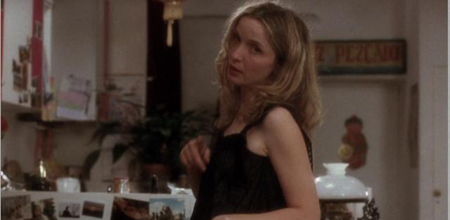*Warning, a few spoilers ahead.*
 Before Sunset is the sequel to Before Sunrise, which picks up the story of Jesse (Ethan Hawke) and Céline (Julie Delpy) nine years after their night together in Vienna. The film explores what has happened to the two characters since their meeting, how that night has made a lasting impact on their lives and how it might impact their futures.
Before Sunset is the sequel to Before Sunrise, which picks up the story of Jesse (Ethan Hawke) and Céline (Julie Delpy) nine years after their night together in Vienna. The film explores what has happened to the two characters since their meeting, how that night has made a lasting impact on their lives and how it might impact their futures.
At the beginning of the film, we learn that Jesse has written an autobiographical novel and he is doing a reading in Paris, the last stop on his book tour. As Jesse answers questions from the audience, flashbacks are shown of he and Celine in Vienna; establishing how the novel was inspired by Céline and reconnecting the audience with their own memories of the previous film. Three journalists are interviewing Jesse: a romantic who is convinced the book’s main characters meet again, a cynic who is convinced that they don’t, and a third one who wanted them to meet again, but doubts that they actually do, the journalists standing in for the audience, representing our various views of romance and possible interpretations of the earlier film. As Jesse speaks with the audience his eyes wander and suddenly he sees Céline in the present moment.
Once the presentation is over, Jesse is told that he must leave for the airport in a little more than an hour and he and Céline go for a walk around Paris, the remainder of the movie unfolding in real time. The languid, expanded feeling of time in Before Sunrise is gone here. Time feels contracted, we are ever aware of Jesse’s flight as the two try to digest the feelings aroused by their meeting and the nine years that have passed. Jesse and Céline interact much less with their environment or other characters and director Richard Linklater keeps the action tightly focused on them, only giving Paris quick sidelong glances. The two discuss their careers and politics and it is revealed that Jesse is married and has a four-year-old son, whom he adores. Celine has become an advocate for the environment and has a photojournalist boyfriend. They are both successful and engaged in the world, however, it becomes clear that they have both experienced disappointments and feel somewhat disconnected from their lives, in part because of the promise of the night they spent together; “I guess when you’re young, you just believe there’ll be many people with whom you’ll connect with. Later in life, you realize it only happens a few times,” Céline says.
I loved Before Sunset from the start, but the first few times I viewed it, I found it very challenging. I respected Linklater’s decision to wade into the ambiguity and complexity of life and relationships with so much honesty, but I mourned what had happened to these characters I had loved and identified with so much. I hated the defense mechanisms that they had, out of necessity, developed — Jesse a bit numb, checking out from daily living, Céline harder, angrier. I found their missed connection mildly devastating — the film reveals that Jesse returned to Vienna six months after their first meeting, but Céline was unable to be there because her grandmother died. I wanted them to be together, but I wasn’t sure how to reconcile that desire with their reality, specifically, the fact that they both had full lives with careers and other people. Similarly, I didn’t want to face the legitimate question of whether they would be any good together if they were given a chance at a real relationship, as Céline quips, “maybe we are only good for a short time wandering around European cities.”
However, with subsequent viewings, my understanding of the film has evolved and I no longer see it in such a tragic light. In an interview about the film, Linklater said:
The great thing about getting a little older is you’re a little more accepting of whatever paths you’ve taken. You’re more likely to be settling into that. I think you’re more comfortable in your own skin, maybe. But below the surface of all that, if you’re brave enough to admit the vulnerability underneath, and the disappointment and sadness and pain, as well as the joy and the beauty — just kind of accepting life in all its honesty — all that’s there if you want to explore that. It was important to depict two people who were aging but who were still the same people. It seems like we’ve seen this a million times: First, youthful romanticism and ideas, and then adult disappointments. But what about adult growth and adult passion? You take passionate, intelligent people, and you add age — that’s a nice formula … I don’t think they miss their youth; it’s just that confronting each other, they’re suddenly connected with what they felt then, and how that is or isn’t possible now. You go through life, but you get these constant reminders, something that takes you back. You have to think about what you wanted in life at a certain age and what you got.
For Jesse and Céline these questions are embodied in a single night and in each other. But the question of how we balance our passion, our need to continue living fully with the realities of daily living can come to us in many guises. As we make and live with our choices and the vagaries of life and time, it is so common to feel dissatisfied or stuck. We may feel that we chose the wrong career, the wrong city, the wrong spouse. Some of us face questions of religious fidelity. We may struggle with balancing our yearning for an authentic spiritual path with our love and loyalty for our religion and the people in it. How do we choose, knowing that our choices may well bring hurt to those we love? When should we let go of unrealistic expectations and when should we refuse to accept lives that we don’t want or no longer serve us? As Jesse says, “I can’t go through life saying that this is no big deal, you know. I mean, this is it! This is actually happening.”Before Sunset does not give us answers as much as it gives full respect to these questions while suggesting that mature and passionate people are capable of facing them. At another point, Jesse tells Céline “Am I getting worse? Am I improving? I don’t know. When I was younger, I was healthier, but I was, uh, racked with insecurity, you know? Now I’m older and my problems are deeper, but I’m more equipped to handle them.”
As the film draws to a close, the characters have worked through many of their defenses and they fully reconnect. Before Sunset has one of the most stunning, tantalizing endings in the history of film, for both its bravery and trust in the audience. As Céline dances, finally relaxed and unselfconscious, to Nina Simone’s “Just in Time,” Jesse and the audience watch, mesmerized. Time has begun to expand again and the film leaves the audience with no firm answers, but a sense of possibility.



Your prose leaves no choice but to watch it again! Thanks, Heidi.
I loved the ending with her dancing.. and for me, they definitely end up together.
Before Sunrise/Sunset are two of my favorite films of all time. I’ve seen both easily a dozen times and have borrowed lines from them on more than a few ocassions (yep, I’m kind of a dork). I was overseas when Sunset came out and had no idea that it existed until a friend mentioned that it was out on dvd. After squealing with delight, my first question was if it was made by the same people and had the same cast because I just couldn’t believe that they actually made a follow up where we would get to find out what happened after the end of Sunrise. Best of all I didn’t have to wait to watch it.
At first I thought the ending was a bit abrupt, not because I felt like more story needed to be told, but because it was over and I didn’t want it to end. I still can’t believe that they actually made Sunset. Ahh, such good stuff, I really enjoyed reading about it here, thanks.
@Jessica, I’m glad you are going to give it another chance. Please return and tell us what you think.
@Helen, so you are a romantic, then? :)
The film went so quickly for me… I found the ending a shock. I like abrupt endings though: I like the agency that they hand over to us, as the viewer. And that could be what’s going on here.
I admit, I was a much bigger fan of ‘Before Sunrise’, though. The reason is the same that I prefer ‘Alien’ over ‘Aliens’… might sound like a strange comparison, but both sequels, for me, lose the primal purity of their predecessors. ‘Before Sunrise’, in my reading, posed a beautiful, and practically perfect philosophical proposition: that of the single night that embraced mortality and experience. I honestly think that nothing Linklater could have done in ‘Before Sunset’ could have improved on the purity of that, for me.
But I’ve only seen it once – I’m sure I need to go back and do more with this progression. I loved the ‘Cafe Pure’, and that whole scene… and the boat on the river.
Interesting Andy, I understand what you are saying, but the ‘Alien,’ ‘Aliens’ comparison doesn’t work for me, partly because as much as ‘Aliens’ is a good sequel, the themes and dilemmas of the second film are much the same as the first and you do lose the primal purity of that conflict. I think ‘Sunrise’ and ‘Sunset’ have the same characters, but they are about very different things — a better comparison would be ‘Godfather’ and ‘Godfather II,’ they work on their own, but, taken together, they make a very impressive whole. I do like the idea that the first film is about the purity of a moment in time. I think if you had to boil down the second film in that way, we would be discussing ambiguity.
I loved the way nine years had aged each of the actors faces and bodies and the way this physical evolution mirrored their emotional, spiritual, and/or philosophical evolution. It’s etched in their faces and eyes. They are softer, a little more rounded in Sunrise; angular and thinner in Sunset. It’s beautiful.
We can only pray that Linklater, Delpy, and Hawke team up again in a few more years like Michael Apted’s “Up” series. In 2013 it will be nine years since Sunset.
Beautifully said.
I know they talked about collaborating again. I hope they do, it is such a rare gift to get to see the evolution of these characters on screen.
I love both of these movies. I saw the first movie shortly after I returned from a backpacking trip across Europe – and after I had met a really great guy on a night train to Nice or Prague. We talked all night, but didn’t hook up, and after watching the movie I kinda wished we had. I didn’t find anyone particularly interesting on my next trip to Europe, and now I’m too old (and married!) to be hooking up with strange guys I meet on trains.